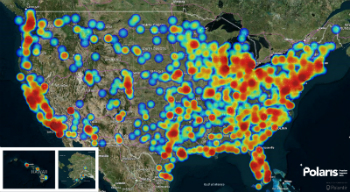
Polaris also released its data for the National Human Trafficking Hotline and the BeFree Textline (233733) for the entire United States today. That 2017 data show a 13 percent jump in reported cases nationwide. The Polaris-operated helplines handled a record 8,759 cases of human trafficking in 2017, bringing the total number of reported cases since 2007 to 40,987. The data from the National Human Trafficking Hotline is one of the largest data sets on human trafficking for the United States.
Additional analysis of the 2017 data, including the most commonly reported types of trafficking, demographic information on survivors, trafficker recruitment and control tactics, and top risk factors for victims, is available here.
Comprehensive case and call data for the United States from the National Human Trafficking Hotline, including for all 50 states and Washington, D.C. are here. Data for the BeFree Textline are here.
Key highlights from the 2017 human trafficking data include:
- Reported cases of human trafficking continue to increase each year. In 2017, 8,759 cases were reported to the National Human Trafficking Hotline and BeFree Textline. This number compares to 7,737 reported cases in 2016. The overall figures represent an 842 percent increase over the 10 years Polaris has operated the Hotline.
- The 2017 data spotlights that human trafficking is a thriving business in the United States. Based on the reports and tips made to the National Hotline by survivors, family members, community members, and others, Polaris was able to identify 4,863 suspected traffickers or people likely exploiting victims. Analysis also found 1,698 suspicious businesses that were described as facilitating potential human trafficking reported to the National Hotline. Based on the information provided and consent from the individual providing information, the National Hotline reported 2,910 cases to law enforcement.
- More survivors are reaching out for help than ever. Based on reports made from family members, community members, survivors themselves, and others, the National Hotline was able to identify 10,615 individual victims of human trafficking in the United States. This represents a 29 percent increase over 2016 when 8,233 victims could be identified. Additionally, 2,144 survivors directly contacted the National Hotline for help, more survivors than ever before. Based on the needs of the survivors who reached out for help in 2017, the National Hotline was able to make 7,832 referrals to services, such as emergency shelter, legal support, and counseling, among other types.
Locations of cases reported to the National Human Trafficking Hotline in 2017. Download a high res version here.
“The National Human Trafficking Hotline is identifying and helping more survivors than ever, all while handling the highest case volume yet. This is a testament to the network of dedicated service providers, trained law enforcement, and survivor advocates working across America to help survivors restore their freedom, but the increasing caseload also indicates how far we still have to go to ensure human trafficking no longer thrives as a lucrative business,” said Bradley Myles, CEO of Polaris. “Through this data, we can illuminate human trafficking trends and identify the pressure points and areas for intervention in various networks to better target efforts and disrupt what is still perceived by traffickers as a low-risk crime.”
BACKGROUND: The National Human Trafficking Hotline is a 24/7, confidential, and multilingual lifeline that provides support and a variety of options for survivors of human trafficking to get connected to help and stay safe. Through a network of nearly 4,000 partner service providers and trusted law enforcement, trained Hotline Advocates take tips of suspected human trafficking from community members and help survivors build plans so they can safely leave their situations or get the help they need to rebuild their lives. The National Hotline can communicate via phone in more than 200 languages through a translation service, as well as text, chat, email, and webform in English and Spanish. The National Hotline is operated by Polaris and funded by the U.S. Department of Health and Human Services (HHS) and other donors.
Prior to January 2018, Polaris operated an independent SMS service called the Polaris BeFree Textline that provided similar capabilities to the National Human Trafficking Hotline but via text. HHS awarded Polaris a new three-year grant to operate the National Hotline in 2017, through which Polaris was able to fully incorporate the BeFree Textline into the National Hotline starting in January. The Hotline also launched chat services in January for the first time.
Polaris emphasizes that the data released are not intended to represent the full scope of human trafficking, but rather the incoming communications received only through the National Human Trafficking Hotline and BeFree Textline. Breakdowns of case data available online are non-cumulative because cases may involve multiple victims and callers do not always provide specific demographic information. In 2017, Polaris released a groundbreaking report on the 25 most common types of human trafficking that exist in the United States, which can be accessed here.
People can be connected to help or report a tip of suspected human trafficking by calling the National Human Trafficking Hotline at 1-888-373-7888, texting “BeFree” (233733), or chatting at www.humantraffickinghotline.org.

